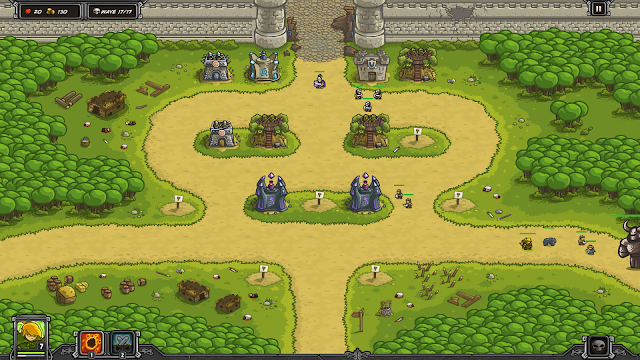A RUSH OF BLOOD TO THE STRATEGY
Before playing Kingdom Rush — a smash hit from Uruguayan developer Ironhide S.A. — the closest I had come to the tower defense genre was through real-time strategy games like StarCraft and Command & Conquer. I avoided both for similar reasons. They demanded long sessions of micromanagement and resource gathering, often without delivering much in return. As far as I remember, Warcraft II: Tides of Darkness was the only one I ever finished.
After completing Kingdom Rush, I realized that while the two genres share some DNA, tower defense is far more direct. This game strips away the excess and delivers the same strategic satisfaction without the bloat. You don’t need to babysit miners or juggle sprawling economies for hours. Each level is self-contained, fast-paced, and decisive — and if you make a mistake, the consequences are immediate. Simply put, Kingdom Rush respects your time far more than any RTS I ever played.
Each level takes place on a single screen, offering a clear and readable overview. A road winds from one end of the map to the other, sometimes branching into multiple paths. Your job is to stop waves of enemies from reaching the exit by placing towers at fixed positions along the route. Survive all the waves, and you advance.
Each tower represents a different unit type with distinct strengths and weaknesses. Most attack from a distance, while one deploys melee units directly onto the road, functioning as living barricades. Enemies automatically draw fire when they enter a tower’s range, and each kill rewards you with gold to spend on upgrades or new constructions. Later in the campaign, towers can branch into specialized upgrade paths, adding further strategic depth.
The core challenge lies in constant adaptation. Do you concentrate your resources around a single choke point, or spread your defenses to gradually wear enemies down? Is it better to build many weak towers or invest in fewer, heavily upgraded ones? The answer depends entirely on the level layout and the composition of the enemy waves.
Between missions, you can further fine-tune your strategy via a global upgrade system. Completing levels awards stars, which can be redistributed freely among tower types. If melee units feel ineffective on a particular stage, you can strip them of upgrades and reinvest in archers, mages, or artillery instead. This flexibility is crucial, especially on harder levels.
In classic Warcraft III fashion, you also control a powerful hero who can be moved freely across the battlefield. Heroes vary widely — some are fast but fragile, others slow but devastating — and unlocking new ones opens up radically different playstyles.
Despite its relatively passive mechanics, Kingdom Rush is mentally demanding. You react rather than act, constantly adjusting tower upgrades, repositioning your hero, and timing two special abilities: disposable militia reinforcements and a devastating meteor strike. As levels grow longer, the pressure intensifies. I rarely played for extended sessions — not out of boredom, but exhaustion.
The main campaign consists of just 16 levels, spread across forest, winter, and volcanic regions, each culminating in a boss encounter. Losing near the end of a long level can be infuriating, especially since there are no checkpoints. Replaying an entire stage just to fail at the same spike in difficulty tests your patience more than once.
The final level nearly broke me. I abandoned the game for months before realizing I could respec all my upgrades from scratch. Once I did, victory came within two attempts. That moment perfectly encapsulates Kingdom Rush: preparation is everything. Choosing the right hero, optimizing towers, understanding the terrain, and anticipating enemy behavior matters far more than brute persistence. A “solid” setup isn’t always enough — sometimes you have to specialize ruthlessly.
Narratively, Kingdom Rush offers little more than flavor text, much like Warcraft II. Its presentation, however, is full of charm: a colorful, cartoonish art style, humorous unit barks, and clear audio cues that become invaluable once you learn to read them. Watching a plan succeed is deeply satisfying; watching it collapse feels genuinely tragic.
Discovering a new subgenre this late was a joy. Kingdom Rush forced me to think differently — to build bottlenecks, exploit terrain, and prioritize efficiency over excess. And best of all, I didn’t have to watch miners mine and whine for hours to make it all happen.
But one question still nags at me:
If I’m defending my homeland, why am I the one advancing steadily eastward — straight toward Mordor?






Comments
Post a Comment